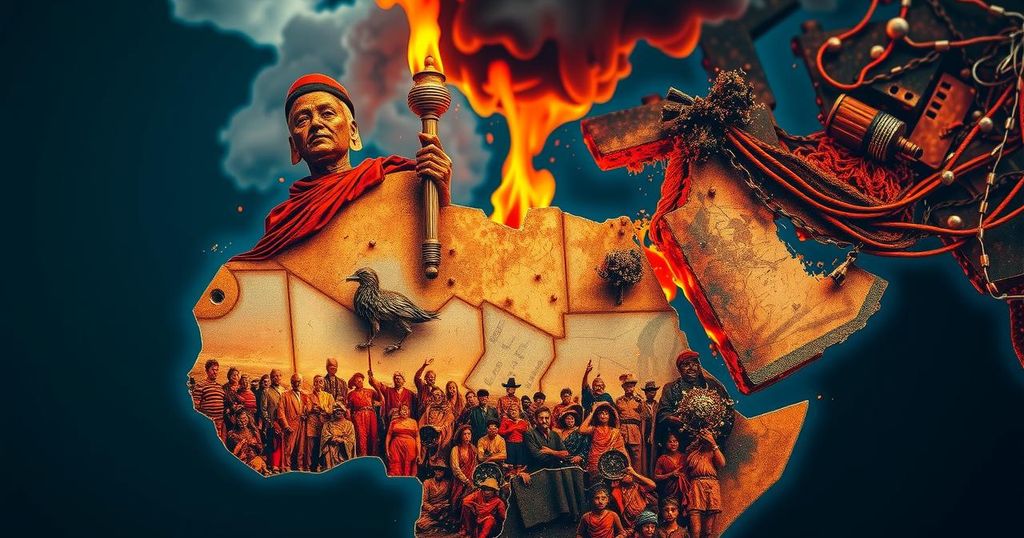Escalating Tensions in the Horn of Africa: A Potential Shift Towards Conflict
Tensions are rising in the Horn of Africa as Egypt, Somalia, and Eritrea discuss forming a collective security alliance against Ethiopia amidst an ongoing civil war and complications from Ethiopia’s agreement with Somaliland. The situation threatens to destabilize the region and could lead to proxy conflicts. Egypt’s strategic encirclement of Ethiopia raises concerns, while Somalia faces internal threats from Al Shabab. Overall, these developments highlight the precarious nature of regional geopolitics in a context of increasing isolation and turmoil.
In recent developments, tensions are escalating in the Horn of Africa as Egypt, Somalia, and Eritrea engage in discussions to form a potential collective security alliance aimed at countering Ethiopia. This diplomatic shift occurred during a meeting in Asmara, Eritrea, on October 10, 2024, where the leaders of these three nations contemplated a framework for alliance that could include collective security measures or economic sanctions directed at Ethiopia. The implications of this meeting are significant, raising alarms regarding the geopolitical stability of the region. The backdrop to these discussions involves a two-year civil war in Ethiopia that has resulted in approximately 600,000 fatalities, compounded by the ongoing strife in neighboring Sudan, which has caused over 150,000 deaths and displaced an estimated 10 million people. Amidst these challenges, the potential formation of an anti-Ethiopian coalition is catalyzed by Ethiopia’s controversial agreement with Somaliland, a self-declared independent region of Somalia that has only recently begun to receive some international recognition, notably from Ethiopia for access to the port of Berbera. This agreement, which would allow Ethiopia, a landlocked country, to utilize the port in exchange for recognition of Somaliland’s sovereignty, has been met with vehement opposition from Somalia and neighboring countries, including Egypt and Eritrea, due to concerns over territorial integrity and regional stability. Egypt’s strategy appears designed to encircle Ethiopia, with the Nile River dam project serving as a focal point for long-standing tensions. Furthermore, the partnership established at this summit might embolden Ethiopia to escalate military operations along Eritrea’s coast, concerning the latter about the prospect of an Ethiopian naval presence. Simultaneously, Somalia grapples with internal security issues, as the militant group Al Shabab becomes increasingly powerful, reportedly collaborating with Houthi forces and sourcing advanced weaponry through illicit channels. The U.S. arms embargo on Somalia has limited national military capabilities, further complicating the security landscape in which Al Shabab thrives. While Eritrea maintains its historic isolation and continues to face international sanctions, its potential alignment with Ethiopia against the Tigray People’s Liberation Front indicates a complex web of alliances driven by mutual interests. The TPLF’s longstanding conflict has resulted in severe humanitarian crises in northern Ethiopia, contributing to food insecurity affecting millions. Consequently, the emerging alliance among Egypt, Somalia, and Eritrea raises alarming prospects of proxy conflicts reminiscent of the Cold War era that could destabilize trade routes and military dynamics within the region. As diplomatic discussions unfold, the impact of these developments on the stability of the Red Sea and beyond remains to be seen. Currently, Ethiopia’s response involves a cautious approach, delaying the implementation of its agreement with Somaliland while potential discussions between Ethiopian and Somaliland leaders are hinted at, marking a critical juncture in the ongoing turmoil. As the international community continues to overlook the Horn of Africa, the region confronts escalating tensions that threaten to spark a significant conflict, posing risks not just at a regional level but on a global scale as well.
The Horn of Africa has long been a region marked by complex geopolitical dynamics and internal conflicts. The current situation is exacerbated by Ethiopia’s internal strife, notably a civil war that has profoundly affected the Ethiopian populace and created regional spillover effects. Concurrently, the political landscape has shifted post-Ethiopia’s controversial recognition of Somaliland, further straining relationships with Somalia. Egypt’s water security concerns surrounding the Grand Ethiopian Renaissance Dam add another layer of complexity, positioning the country to seek alliances against Ethiopia. As smaller nations like Somalia and Eritrea align with Egypt, the potential for escalated conflict increases, calling into question the stability of the entire region.
The recent discussions among Egypt, Somalia, and Eritrea signify a considerable escalation in diplomatic tensions within the Horn of Africa, as they contemplate forming an anti-Ethiopian coalition in response to Ethiopia’s deal with Somaliland. The backdrop of the ongoing civil unrest in Ethiopia, alongside the rise of Al Shabab’s influence in Somalia, suggests a precarious future for regional security. The potential for proxy conflicts reminiscent of previous geopolitical tensions could pose dire consequences not only for local populations but for international stakeholders concerned with stability in the Red Sea and surrounding areas. As these nations move forward with their negotiations, the world must remain vigilant and engaged to prevent further deterioration of this increasingly volatile region.
Original Source: www.orfonline.org




Post Comment